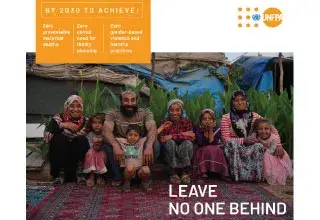ANKARA – “Surveys in Covid-19 and Post Covid-19 Days” study which was prepared by Hacettepe University of Institute Population Studies (HUIPS) with the support of the United Nations Population Fund, UNFPA Turkey, is available online!
2020 has been an extraordinary year due to the emergence of a global pandemic caused by the highly infectious COVID-19 virus. While everything we used to know as “normal” has been changed in this process, one of the areas which have been affected most by these changes has been social research, especially surveys. While the pandemic's effect on survey research differs between countries, it appears that the modes and the ways of data collection have been considerably affected by this process globally, which has resulted in several concerns regarding the fulfilment of the need for information in various areas.
This report has been prepared to analyze these impacts on survey research and the related developments in the field focusing on the period between the beginning of the pandemic and December 2020. The report aims to enhance the understanding of the pandemic's effects on survey research and its future implications. To achieve this, in the report, recent developments in survey research have been reviewed based on the analysis of several survey organizations’ websites including World Bank, UNICEF, UN Women, ILO, UNSD, WHO and EUROSTAT, webinars held by professional and academic organizations like AAPOR, WAPOR, RSS, PAA, some journal articles, and six interviews conducted with experts from abroad and Turkey.
From face-to-face to phone surveys
According to the report, the pandemic has imposed several obstacles for researchers and policy-makers to collect data and face-to-face surveys have been the most affected. Many surveys that are conducted face-to-face have begun to be applied by telephone. On some occasions, even mail/telephone surveys were challenged due to service sector interruptions. Given that mail/telephone surveys are more prone to non-response errors compared to face-to-face surveys which generally have the highest response rates, this transition in modes of surveys had an influence on both the quality and quantity of data collected.
As the report showed, one of the main areas which are adversely influenced by this situation has been data collection on health issues, especially DHS (Demographic and Health Surveys) and MICS (Multiple Indicator Cluster Surveys), on which the face-to-face survey is the only way to reach reliable data. Data collection on sensitive topics such as violence against women has also been halted in the process as face-to-face communication and privacy are essential in such fields of research.
The pandemic's effects have also been felt more on face-to-face cross-sectional household surveys than longitudinal ones, as there are often alternative modes of interviewing available to follow-up participants.
Will Big Data Replace Traditional Research?
The COVID-19 pandemic has caused important changes in the structure of the research and the future implications of these changes as well. As the report shows, the changes in survey research during the pandemic vary between different countries depending on their internet and other related infrastructures and resources required to apply alternative data collection methods such as phone/mail surveys and the use of big data sources, such as administrative data.
Among others, one of the highlights in the report was the increasing role of the internet in data collection and the increasing prominence of big data. New platforms such as Facebook Ads and Google Ads have become prominent in recruiting participants for the research in times of COVID-19. However, the report also warned researchers that these results must be approached with caution since not all members of the population have access to such platforms, or choose to participate.
It was noted that big data will not replace traditional survey research but it will rather have a complementary role in the future. The report also showed that some of the changes in survey research will be permanent when the pandemic is over such as the use of mixed modes where different methods to collect data are applied.
What’s next?
In addition to having analyzed the existing situation in survey research under the pandemic conditions, the report also put forward some future implementations and recommendations.
In the report, the need for more transparency and documentation for research conducted by the private and public sectors in Turkey has been emphasized. It is also highlighted that whether household behaviors will differ in face-to-face surveys when the pandemic is over is an important issue regarding response rates and cooperation, which researchers need to consider while carrying out research.
The report has also shown the ways the challenges that occurred during the pandemic could be overcome by the researchers. Having emphasized the role of international organizations and survey research communities in the process, the report drew attention to the guidelines and recommendations by institutions such as the World Health Organization, UN agencies, and EUROSTAT as the main resources which could be consulted by the researchers and policy-makers.
You can read the whole study conducted by Prof. A. Sinan Türkyılmaz, Dr. Tuğba Adalı and Dr. Yaser Koyuncu here.
You can reach the expert interview videos conducted in the scope of the study with James Lepkowski, Raphael Nishimura, Frauke Kreuter, Attila Hancıoğlu, Oğuzhan Akyıldırım, Enver Taştı to better understand the pandemic's impact on research and its future implications by clicking on their names.



